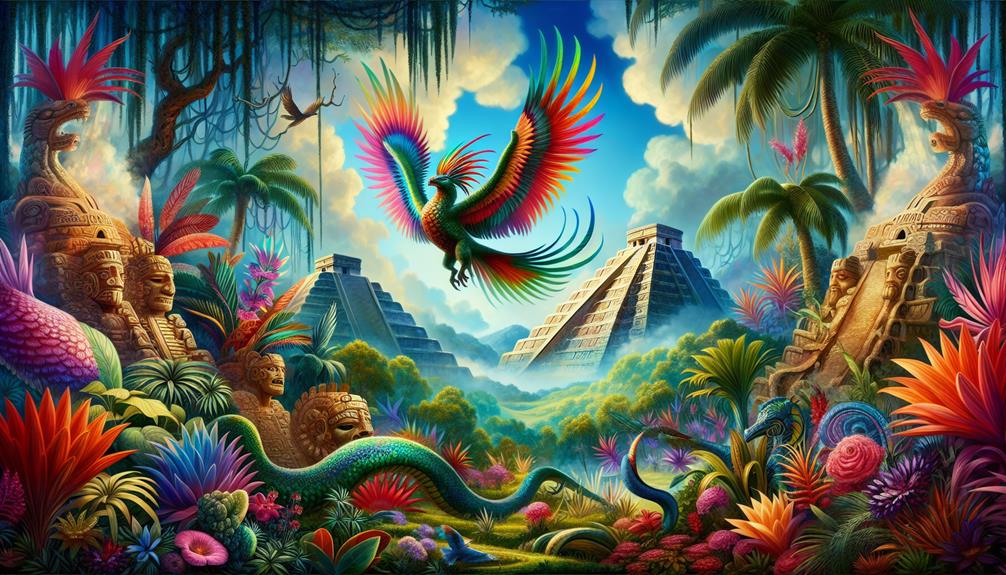Quetzalcoatl Mythology: The Feathered Serpent Deity
When you explore the mythology of Quetzalcoatl, the feathered serpent deity, you encounter a fascinating blend of symbolism and significance that transcends mere storytelling. Picture a creature adorned with vibrant feathers, embodying the harmony between the skies and the earth, a representation of life’s duality. You’ll discover how this powerful figure not only inspires creativity and knowledge but also plays a vital role in the agricultural foundations of Mesoamerican societies. What might his influence reveal about ancient cultures and their relationship with nature? The layers of Quetzalcoatl’s mythology invite further examination.

Origins of Quetzalcoatl
Quetzalcoatl, often depicted as a feathered serpent, has its roots in ancient Mesoamerican cultures, where he emerged as a powerful deity symbolizing wind, knowledge, and life.
You’ll find his presence woven through the rich tapestry of civilizations like the Olmecs, Toltecs, and Aztecs.
In these cultures, Quetzalcoatl wasn’t just a god; he represented the duality of existence, bridging the heavens and the earth.
As you explore the myths, you’ll encounter tales of his creation, often linked to the birth of humanity.
Quetzalcoatl’s association with the wind paints him as a bringer of change and transformation, breathing life into the world.
His wisdom is reflected in the arts, agriculture, and the calendar, emphasizing the importance of knowledge for societal growth.
In the bustling temples and vibrant marketplaces of ancient cities, you can almost hear the chants invoking his name.
Whether through elaborate rituals or simple daily prayers, the people honored him as a guide, protector, and teacher.
Quetzalcoatl’s origins lay in the hearts and minds of those who sought connection with the divine, making him a lasting symbol of hope and enlightenment.
Symbolism and Attributes
The rich imagery surrounding this feathered serpent deity highlights his multifaceted symbolism, embodying the interplay of creation, knowledge, and the natural world.
Quetzalcoatl’s feathers represent the heavens, while his serpent body connects to the earth, illustrating the Unity of sky and land. You’ll notice how he symbolizes the duality of existence—life and death, day and night.
As a god of knowledge, Quetzalcoatl embodies wisdom and enlightenment. He’s often associated with the wind, which stirs thoughts and Ideas, urging you to seek understanding and truth.
His association with maize, a crucial crop, portrays him as a giver of life, nourishing both the body and the spirit.
You might also find that Quetzalcoatl’s attributes extend to artistry and creativity.
As the patron of artisans, he inspires innovation and skill, connecting human endeavors to divine influence.
In rituals, he often appears as a guiding force, fostering harmony between humanity and nature.
His complex character invites you to explore themes of balance, transformation, and the quest for knowledge, making him a central figure in Mesoamerican mythology.
Influence on Mesoamerican Cultures
Influencing various Mesoamerican cultures, this feathered serpent deity shaped religious practices, art, and societal structures across civilizations like the Aztecs and Toltecs. Quetzalcoatl’s presence in these cultures is evident in their temples adorned with intricate carvings of the serpent, capturing its dual nature of earth and sky. You’d witness vibrant murals depicting Quetzalcoatl, often surrounded by symbols of fertility and wisdom, reflecting his role as a creator god.
In religious practices, Quetzalcoatl was central to ritual ceremonies. The Aztecs, for instance, honored him through offerings and festivals, celebrating the cycles of life and agriculture. His teachings emphasized morality and knowledge, profoundly influencing educational institutions.
Socially, Quetzalcoatl represented ideals of leadership and civilization, guiding rulers in matters of governance. His narrative encouraged the pursuit of enlightenment, fostering a culture that valued intellect and creativity.
As you explore the ruins of ancient cities, you can still feel the impact of Quetzalcoatl on Mesoamerican civilization, a legacy that intertwines mythology with the very fabric of their society. This deity’s influence continues to resonate, echoing through the ages.
Discover More: The Mythology of Quetzalcoatl
The mythology of Quetzalcoatl, the feathered serpent deity, is a captivating blend of wisdom, power, and cultural significance. This revered figure in Aztec lore embodies various aspects of their spiritual and agricultural life, offering profound insights into their worldview. To delve deeper into the fascinating mythology of Quetzalcoatl, we invite you to read a detailed article on Quetzalcoatl mythology. This comprehensive piece explores his legends, symbolism, and the enduring legacy of this iconic deity.


